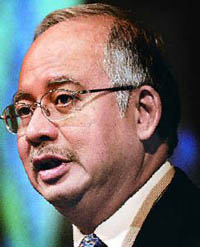Malaysia and Indonesia offer troops to U.N. while Israel protests
Two Muslim countries - Malaysia and Indonesia - insist on providing troops for the U.N. peacekeeping mission in Lebanon, while Israel continues to protest their involvement on the basis that the nations' governments do not recognize the State of Israel.

Bangladesh, which also has no ties with Israel, said it was aware of Israel's rejection of troops from the three nations, which are among the only ones to have offered front-line troops to the force.
All were highly critical of Israel during the 34-day conflict.
Israel's rejection adds to troubles faced by the United Nations, which is already struggling to attract soldiers from European nations seen as essential to balance out contributions from Islamic countries.
According to AP, Indonesia, the world's most populous Muslim nation, said Israel should not be able to dictate which countries send troops to the southern Lebanese border to enforce a truce between Hezbollah guerillas and Israel.
"We insist that the decision is taken by United Nations, not Israel," said Defense Minister Juwono Sudarsono. "It is illogical to put diplomatic relations (with Israel) as a precondition to joining the force."
Israel said countries that don't have diplomatic relations with the Jewish state should not participate, saying it would be difficult to communicate with them since they don't recognize its existence. It also said it opposes the participation of countries that sympathized with Hezbollah during the conflict.
Indonesia's government has said it would contribute up to 1,000 troops to any force, a move likely to be domestically popular. Photos of soldiers - some already wearing U.N. blue helmets - have regularly appeared in the local media in recent weeks.
Malaysia's Deputy Prime Minister Najib Razak, who is also the defense minister, told the New Straits Times newspaper that the Israeli rebuff was based on a "purely technical" matter, and that his country has a proven track record in several peacekeeping missions.
"There is no reason why we cannot play a role as objective and efficient peacekeepers who are familiar with the United Nations guidelines for peacekeeping operations," Najib was quoted as saying. "There is no problem with the integrity and the professionalism of our armed forces."
The U.N. cease-fire resolution does not explicitly give Israel authority to block countries from joining the peacekeeping mission, but it does say the force should "coordinate its activities ... with the government of Lebanon and government of Israel."
Like other countries, Indonesia has also expressed concern about whether the force will be asked to disarm Hezbollah fighters, as called for in a September 2004 U.N. resolution.
Bangladesh's Foreign Minister M. Morshed Khan told reporters that the Muslim-majority nation would send its troops to Lebanon only if "all parties in the conflict accept" that.
Dhaka is still unclear about the terms of the mission, Khan said.
Subscribe to Pravda.Ru Telegram channel, Facebook, RSS!


